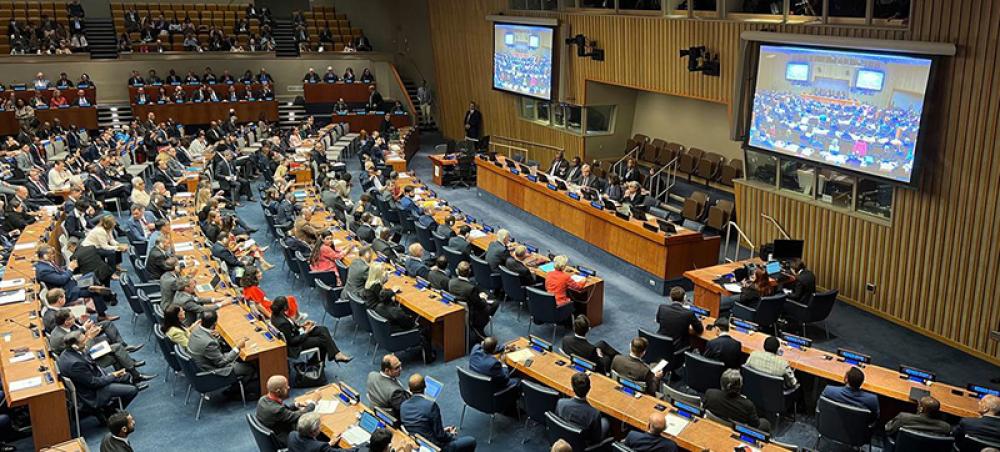Just Earth News | @justearthnews | 21 Sep 2023, 02:55 am Print
 Antonio Guterres
Antonio Guterres Photo Caption: UN News/Anton Upensky
“Horrendous heat is having horrendous effects”, the UN chief declared on Wednesday, as a broad global coalition of “movers and doers” politicians, business and civil society gathered in New York for the first ever Climate Ambition Summit.
Front and centre was an urgent call to action, to prevent cascading climate disasters through a just and equitable energy transition – before it’s too late.
In his impassioned address on the sidelines of the UN General Assembly to politicians, business, activists and civil society leaders, Secretary-General António Guterres issued a stark warning about the dire consequences of inaction.
With extreme weather events accelerating, “humanity has opened the gates to hell,” said the Secretary-General, describing distressing scenes of farmers helplessly watching crops washed away by floods, the emergence of virulent disease due to rising temperatures, and the mass exodus of people fleeing historic wildfires.
Race for solutions
“Our focus here is on climate solutions – and our task is urgent”, he said.
He warned that climate action was being “dwarfed by the scale of the challenge”, with humanity heading towards a 2.8°C temperature rise, increasing danger and instability.
But “the future is not fixed” he added and the Paris Agreement target of limiting temperature rise as close as possible to 1.5°C is still attainable.
“We can still build a world of clear air, green jobs, and affordable clean power for all,” he said, addressing the high-level gathering of “first movers and doers”.
Driving force for change
Activists are refusing to be silenced, Indigenous Peoples are rallying to defend their ancestral land, and corporate executives are transforming how they do business.
The UN chief is calling for a Climate Solidarity Pact that will hold major emitters more to account, and calling on wealthy countries to support emerging economies so they can weather the crisis.
The Acceleration Agenda calls on governments “to hit fast forward”, he added.
Anger rising
The Secretary-General spoke of the need for more climate justice, recognizing the anger felt by many of the world's poorest nations disproportionately affected by a crisis they did not cause.
“Many of the poorest nations have every right to be angry,” he added, explaining that promised finance had not materialized while the costs of borrowing remain sky-high.
“All parties must operationalize the Loss and Damage Fund at COP28,” he urged and reminded the developed countries must meet the $100 billion commitment, replenish the Green Climate Fund, and double adaptation funding.
Creating early warning systems for everyone by 2027 is a must, too.
Rebuilding trust
The Acceleration Agenda also calls for businesses and financial institutions to embark on true net zero pathways, with a focus on transparency and credibility in emission reduction plans.
“Every company that truly means business, must create just transition plans that credibly cut emissions and deliver climate justice,” the Secretary-General said.
He called for action beyond the meeting rooms of New York.
“We can – and we must turn up the tempo,” he concluded, to loud applause around the room.
Responding to the call, Kenyan President William Ruto, which recently hosted the Africa Climate Summit, spoke about the continent’s huge potential.
With about 30 per cent of the world’s mineral resources and vast biodiversity, it is capable of “green global manufacturing” at scale, given the necessary financial support.
“Unlike other regions, Africa does not have to choose between satisfying new demand and decarbonizing existing capacities, because our existing capacity is very low,” he explained, adding that the continent can “leapfrog into fully green industrial paradigm”.
Climate justice
Financing and environmental justice were themes running throughout the discussions.
Lidy Nacpil is Coordinator of the Asian Peoples' Movement on Debt and Development, an NGO advocating for the transition to renewable energy.
New agreements are needed to make the shift “without loopholes or excuses”, she said. An international treaty on the non-proliferation of fossil fuels and a global phase-out plan are needed to reach “real zero” by 2050.
“We, the people of the Global South are not asking for aid or assistance. Climate finance is an obligation and a part of reparations for historical and continuing harms and injustices,” she asserted the right “not just to survive, but to build a better home and future for our children.”
No buy out
Developed countries at the Summit said they were prepared to contribute their fair share. President of Austria Alexander Van der Bellen, for example, announced an additional €220 million for tackling climate change between 2023 to 2026.
“€50 million will be used to support programmes and projects related to loss and damage,” he assured. The country will also increase its contribution to the Green Climate Fund by a quarter, for a total of €160 million.
However, the Austrian president said, “We cannot buy ourselves out of the climate crisis. We must curb emissions at home.”
His country aims to achieve the ‘net zero’ target by 2040.
- Why are scientists warning about surging glaciers? All details inside
- Mass coral bleaching to hit Great Barrier Reef most years, study reveals
- Global water bankruptcy shock: Why the planet’s most precious resource Is collapsing
- Would you pay $1 million to stay on the moon? This company thinks so
- A historic UN deal is about to transform how the world protects its oceans





-1763561110.jpg)
